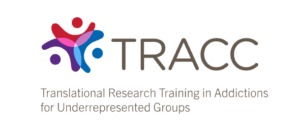About
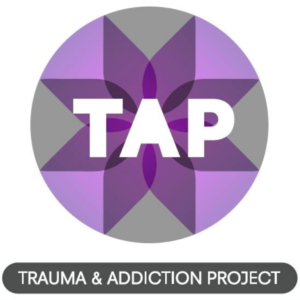 The Trauma and Addiction Project Lab (TAP LAB) is a multidisciplinary program of research at the Rutgers Center of Alcohol and Substance Use Studies (previously at the Department of Psychology, City College of New York, City University of New York). TAP LAB integrates cognitive, interpersonal, and neurodevelopmental perspectives on traumatic stress and addiction over the lifespan and examines the impact of contextual factors such as race, ethnicity, culture, and socioeconomic status on treatment process and outcome. TAP LAB is committed to training and mentoring students, faculty, and researchers and developing institutional infrastructure to support addiction research. TAP is also dedicated to disseminating significant research findings to inform communities of the far-reaching consequences of trauma and addiction for disenfranchised populations and guidelines for effective clinical practice.
The Trauma and Addiction Project Lab (TAP LAB) is a multidisciplinary program of research at the Rutgers Center of Alcohol and Substance Use Studies (previously at the Department of Psychology, City College of New York, City University of New York). TAP LAB integrates cognitive, interpersonal, and neurodevelopmental perspectives on traumatic stress and addiction over the lifespan and examines the impact of contextual factors such as race, ethnicity, culture, and socioeconomic status on treatment process and outcome. TAP LAB is committed to training and mentoring students, faculty, and researchers and developing institutional infrastructure to support addiction research. TAP is also dedicated to disseminating significant research findings to inform communities of the far-reaching consequences of trauma and addiction for disenfranchised populations and guidelines for effective clinical practice.
Research Aim(s)
- Examine the effects of trauma exposures and addiction on the mind and body.
- Examine the role of threat-related cognitive processing in the development and maintenance of Posttraumatic Stress Disorder (PTSD) and associated interpersonal impairments.
- Examine the efficacy of treatment interventions for co-occurring PTSD and addiction, as well as associated psychiatric issues and conditions.
- Examine the longitudinal impact of COVID-19 on the coronavirus, opioid, and systemic racism (COR) syndemic.
Active Research Projects
PROJECT HARMONY: A Virtual Clinical Trial (VCT) Meta-Analysis with Individual Patient Data for PTSD and Alcohol and Other Drug (AOD) Use Disorders
PTSD and AO D are frequently co-occurring disorders. Individually, they each pose significant public health problems, which are substantially exacerbated by their comorbidity. The PTSD/AOD VCT study is a National Institute on Alcohol Abuse and Alcoholism funded integrative data analysis project that will synthesize disparate data from 50 existing PTSD and alcohol and other drug disorders (AOD) treatment studies (resulting in a total of 4,544 study participants) to examine the relative efficacy of different AOD/PTSD treatments. Led by a team of experts in PTSD/AOD treatment and clinical trials from Rutgers Center of Alcohol and Substance Use Studies (Hien (MPI) & Ruglass), RTI International (Morgan-Lopez (MPI) & Saavedra), Medical University of South Carolina (Back, Brady & Killeen) & Columbia University (Campbell), the VCT study will use three novel and sophisticated data analytic approaches- meta-analysis of individual patient data, integrative data analysis, and propensity score weighting- to provide clear and definitive recommendations regarding which PTSD/AOD treatments are optimally effective. It will also indicate who is more or less likely to benefit from specific treatments, and whether the mechanisms of change in these treatments are similar or distinct. See Project Harmony website: https://www.projectharmonyvct.com for more details.
D are frequently co-occurring disorders. Individually, they each pose significant public health problems, which are substantially exacerbated by their comorbidity. The PTSD/AOD VCT study is a National Institute on Alcohol Abuse and Alcoholism funded integrative data analysis project that will synthesize disparate data from 50 existing PTSD and alcohol and other drug disorders (AOD) treatment studies (resulting in a total of 4,544 study participants) to examine the relative efficacy of different AOD/PTSD treatments. Led by a team of experts in PTSD/AOD treatment and clinical trials from Rutgers Center of Alcohol and Substance Use Studies (Hien (MPI) & Ruglass), RTI International (Morgan-Lopez (MPI) & Saavedra), Medical University of South Carolina (Back, Brady & Killeen) & Columbia University (Campbell), the VCT study will use three novel and sophisticated data analytic approaches- meta-analysis of individual patient data, integrative data analysis, and propensity score weighting- to provide clear and definitive recommendations regarding which PTSD/AOD treatments are optimally effective. It will also indicate who is more or less likely to benefit from specific treatments, and whether the mechanisms of change in these treatments are similar or distinct. See Project Harmony website: https://www.projectharmonyvct.com for more details.
Expanding the COVID-Dynamic Study to Examine Patterns and Correlates of Substance Use During the Coronavirus Pandemic
As we face the immediate and longer-term impacts of the coronavirus pandemic, we see two broad domains that confer risk for the development of substance use problems/disorders, one involving medically related adverse impacts due to traumatic stress exposure and loss, and the second involving economic losses and social strains. In both of these domains, substance use, acting as a self-medication, will lead for some to problematic use and disorders. This study seeks to explore the longitudinal impacts of coronavirus related factors (stressors and trauma, losses, illnesses, economic conditions) on substance use patterns in a national sample, collaborating with the COVID Dynamic Study (CDS) at Caltech and Rutgers CAS’ Peggy Swarbrick and Alex Bauer. Specifically, the COVID Dynamic Study, “Characterizing the dynamics of emotional and social attitudes during the covid-19 pandemic” is a big-data-driven longitudinal survey study of 1,800 individuals employing survey responses and experimental tasks. Its overarching translational goal is to help to improve messaging and compliance to public health regulations related to covid-19 through a better understanding of the socio-emotional factors that influence people’s decision-making. To quantify longitudinal effects that could inform public health policy, anonymized data is collected on subjects’ implicit and explicit socio-emotional biases, to characterize how these might relate to social, economic, moral and political judgments. See COVID Dynamic Study (CDS) at Caltech for more details.
Translational Research Training in Addictions for Racial/ Ethnic Minorities at the City College of New York and Columbia University Medical Center aims to increase the number of scientists from underrepresented minority groups conducting translational addiction research.
According to a 2011 article in Science, a low percentage of minority scientists achieve success in research award funding despite years of field-wide diversification efforts. Additionally, as the field of translational neuroscience continues to expand, the numbers of qualified minority scientists with interdisciplinary training lags behind. TRACC-RU addresses these gaps by reaching earlier into the career development pipeline to identify and actively facilitate the profe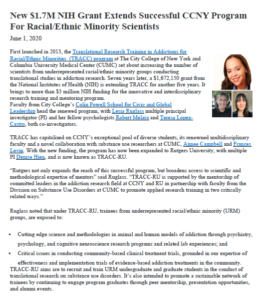 ssional success of the most talented minority students. The National Institute of Health (NIH) awarded $1.7 million to continue to support TRACC-RU’s mission. TRACC-RU capitalizes on CCNY’s exceptional pool of diverse students, its renowned multidisciplinary faculty and a novel collaboration with substance use researchers at CUMC. TRACC-RU has trained 23 researchers over the past five years. Trainees are selected from a pool of faculty-nominated Rutgers and CCNY graduate psychology students plus students in the Sophie Davis School of Biomedical Education’s BS/MD program. For more information visit the website: https://tracc.ccny.cuny.edu/
ssional success of the most talented minority students. The National Institute of Health (NIH) awarded $1.7 million to continue to support TRACC-RU’s mission. TRACC-RU capitalizes on CCNY’s exceptional pool of diverse students, its renowned multidisciplinary faculty and a novel collaboration with substance use researchers at CUMC. TRACC-RU has trained 23 researchers over the past five years. Trainees are selected from a pool of faculty-nominated Rutgers and CCNY graduate psychology students plus students in the Sophie Davis School of Biomedical Education’s BS/MD program. For more information visit the website: https://tracc.ccny.cuny.edu/
Completed Studies
Opioid IRG TRAUMA Study: Developing a Trauma-Informed App for Female Opioid Users Receiving Medication Assisted Treatment
This study is funded by the Opioid Interdisciplinary Research Group, Institute of Health, Health Care Policy, and Aging Research at Rutgers Biomedical and Health Sciences. There is a major public health need to address the high lev els of traumatic stress symptoms among female opioid users. The growth in numbers of female opioid users has contributed to America’s opioid epidemic, and research shows that women are more likely to use opioids to manage the symptoms they experience from trauma. This pilot study will inform development of a larger NIH grant, which will focus on tailoring a trauma-informed app and assess its implementation in community clinics for female opioid users. Qualitative interviews with 15 women on MAT (medication assisted treatment) and 8 providers are aimed to inform the development of a technology-based intervention adjunctive to MAT. A technology application addressing the trauma symptoms of these women would be used in conjunction with their primary care treatment. Collaborators include colleagues Drs. Padma Arvind, Mary-Catherine Bohan, Aimee Campbell, Suchismita Ray, Tanya Saraiya, and Margaret Swarbrick at Rutgers’ University Behavioral Health Care-Specialized Addiction Treatment Services (SATS) and Wei Ji Point programs, the School of Management and Labor Relations, and the School of Health Professionals.
els of traumatic stress symptoms among female opioid users. The growth in numbers of female opioid users has contributed to America’s opioid epidemic, and research shows that women are more likely to use opioids to manage the symptoms they experience from trauma. This pilot study will inform development of a larger NIH grant, which will focus on tailoring a trauma-informed app and assess its implementation in community clinics for female opioid users. Qualitative interviews with 15 women on MAT (medication assisted treatment) and 8 providers are aimed to inform the development of a technology-based intervention adjunctive to MAT. A technology application addressing the trauma symptoms of these women would be used in conjunction with their primary care treatment. Collaborators include colleagues Drs. Padma Arvind, Mary-Catherine Bohan, Aimee Campbell, Suchismita Ray, Tanya Saraiya, and Margaret Swarbrick at Rutgers’ University Behavioral Health Care-Specialized Addiction Treatment Services (SATS) and Wei Ji Point programs, the School of Management and Labor Relations, and the School of Health Professionals.
READING FACES Study TREATLAB at CCNY (https://treatlabccny.wordpress.com)
Our prior work (see Completed Projects > Social SCAN) applied social cognitive and affective (SCA N) experimental methods to study trust and fear among individuals with Posttraumatic Stress Disorder (PTSD). Those with PTSD perceived facial stimuli as more trustworthy in comparison to trauma-exposed individuals without PTSD (Fertuck et al., 2016). Reading Faces extends this work by investigating the behavioral and neural mechanisms underlying trustworthiness perception among three groups: individuals with high post-traumatic symptoms, low post-traumatic symptoms, and individuals with no history of trauma exposure. A second aim of the Reading Faces project is to test the efficacy of an attentional learning task: can disruptions in social cognition related to PTSD improve with attentional training? While electroencephalography (EEG) is being recorded, participants in the laboratory rate faces and then complete an attentional training task. 20 High PTSD, 20 Trauma Exposed and 20 Controls participated in this study.
N) experimental methods to study trust and fear among individuals with Posttraumatic Stress Disorder (PTSD). Those with PTSD perceived facial stimuli as more trustworthy in comparison to trauma-exposed individuals without PTSD (Fertuck et al., 2016). Reading Faces extends this work by investigating the behavioral and neural mechanisms underlying trustworthiness perception among three groups: individuals with high post-traumatic symptoms, low post-traumatic symptoms, and individuals with no history of trauma exposure. A second aim of the Reading Faces project is to test the efficacy of an attentional learning task: can disruptions in social cognition related to PTSD improve with attentional training? While electroencephalography (EEG) is being recorded, participants in the laboratory rate faces and then complete an attentional training task. 20 High PTSD, 20 Trauma Exposed and 20 Controls participated in this study.
The COPE Study
Concurrent Treatment for Substance Dependent Individuals with Post-Traumatic Stress Disorder (PTSD). This NIDA funded clinical trial used a randomized, controlled, repeated measures design to assess the efficacy of two active treatments (Concurrent Treatment of PTSD and Substance Dependence and Relapse 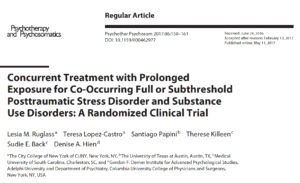 Prevention Therapy) as compared to a control group in treating individuals with substance dependence and PTSD. Concurrent Treatment for PTSD and Substance Dependence was a manualized 12-week intervention, which applied cognitive-behavioral strategies and prolonged exposure (PE) techniques. Relapse Prevention Therapy is a widely used cognitive-behavioral skills training approach to initiating and maintaining abstinence from various types of substance abuse. 110 men and women with PTSD and substance dependence participated in this trial.
Prevention Therapy) as compared to a control group in treating individuals with substance dependence and PTSD. Concurrent Treatment for PTSD and Substance Dependence was a manualized 12-week intervention, which applied cognitive-behavioral strategies and prolonged exposure (PE) techniques. Relapse Prevention Therapy is a widely used cognitive-behavioral skills training approach to initiating and maintaining abstinence from various types of substance abuse. 110 men and women with PTSD and substance dependence participated in this trial.
This study aimed to:
- evaluate the efficacy of the interventions in reducing substance use, PTSD symptoms, and global psychiatric symptoms
- assess differences in retention across treatment groups
SOCIAL SCAN Pilot Study
This City College of New York CITY SEEDS funded pilot study employed a case-control experimental design using innovative, 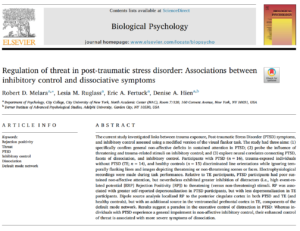 transdisciplinary assessment methodologies to examine how sociality affects threat processing in Posttraumatic Stress Disorder (PTSD) and contributes to interpersonal impairments. A modified version of the “Trust-Fear Facial Discrimination Task” and a Temporal Flanker Task were used to investigate how sociality influences threat appraisal in individuals with and without PTSD. The neural markers of social versus nonsocial appraisal will be explored through Evoked-Related Potentials (ERP) markers using electroencephalography (EEG). Participants in the case group were 30 men and women with PTSD without co-morbid psychiatric diagnoses. The control group consisted of 15 healthy men and women.
transdisciplinary assessment methodologies to examine how sociality affects threat processing in Posttraumatic Stress Disorder (PTSD) and contributes to interpersonal impairments. A modified version of the “Trust-Fear Facial Discrimination Task” and a Temporal Flanker Task were used to investigate how sociality influences threat appraisal in individuals with and without PTSD. The neural markers of social versus nonsocial appraisal will be explored through Evoked-Related Potentials (ERP) markers using electroencephalography (EEG). Participants in the case group were 30 men and women with PTSD without co-morbid psychiatric diagnoses. The control group consisted of 15 healthy men and women.
This study aimed to:
- answer critical questions about how sociality affects threat processing in Posttraumatic Stress Disorder (PTSD) and contributes to interpersonal impairments
- examine whether social and nonsocial threat appraisal tasks will be able to discriminate between individuals with and without PTSD
- evaluate differences in levels of distrust and threat perception between the case and control groups
SAFE STEPS: Combined Pharmacotherapy and Seeking Safety for PTSD and Alcohol Use Disorders. This NIAAA funded clinical trial used a randomized, double-blind, repeated measures design to evaluate the efficacy of Seeking Safety (SS) in combination with an anti-depressant medication (Zoloft) in reducing alcohol use, PTSD severity and psychiatric symptoms over time. SS is an integrated cognitive-behavior therapy for the treatment of PTSD and substance use disorders. Eligible female participants are randomly assigned to one of two conditions (Seeking Safety plus Zoloft or Seeking Safety plus placebo). 69 individuals with PTSD and alcohol related problems participated in this study.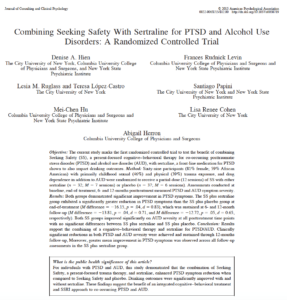
This study aimed to:
- assess the efficacy of adding an anti-depressant medication to an empirically tested cognitive-behavioral treatment for women with co-morbid PTSD and alcohol related disorders.
- assess the differences in retention rates across the two treatment conditions
“Women and Trauma” Multi-Site Study in NIDA’s Clinical Trials Network (CTN 0015)
This NIDA-funded clinical trial used a randomized, controlled, repeated measures design 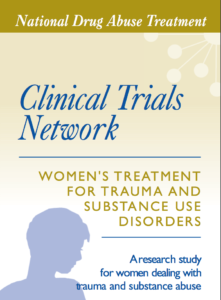 to assess the effectiveness of Seeking Safety (SS) compared with a control treatment (Women’s Health Education, WHE), in addition to standard outpatient substance abuse treatment on psychiatric symptoms and substance use outcomes. Seeking Safety is an integrated
to assess the effectiveness of Seeking Safety (SS) compared with a control treatment (Women’s Health Education, WHE), in addition to standard outpatient substance abuse treatment on psychiatric symptoms and substance use outcomes. Seeking Safety is an integrated 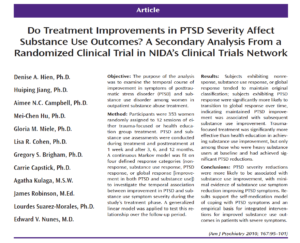 cognitive-behavior therapy for the treatment of PTSD and substance use disorders. Women’s Health education was developed for this trial to serve as a credible comparison with the rationale being the connection between trauma and physical health issues. Participants were 353 women with PTSD receiving treatment at community substance abuse programs at six sites across the country.
cognitive-behavior therapy for the treatment of PTSD and substance use disorders. Women’s Health education was developed for this trial to serve as a credible comparison with the rationale being the connection between trauma and physical health issues. Participants were 353 women with PTSD receiving treatment at community substance abuse programs at six sites across the country.
This study:
- assessed the effectiveness of adding two psychosocial interventions to on-going substance abuse treatment
- evaluated the application of the treatment in community settings when delivered by clinicians in the community
Treatment Outcomes for Cocaine Dependent Women Study
This NIDA-funded clinical trial used a quasi-experimental design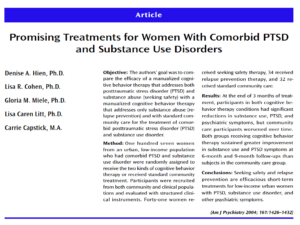 to assess the effect of two cognitive-behavioral therapies (Seeking Safety and Relapse Prevention Treatment) on a range of issues associated with complex trauma. Eligible participants were randomly assigned to one of the two psychotherapy treatments and were seen twice weekly for approximately three months. A non-randomized treatment-as-usual comparison group was also being studied. Participants were 107 urban, low-income women with co-morbid substance use disorders and PTSD.
to assess the effect of two cognitive-behavioral therapies (Seeking Safety and Relapse Prevention Treatment) on a range of issues associated with complex trauma. Eligible participants were randomly assigned to one of the two psychotherapy treatments and were seen twice weekly for approximately three months. A non-randomized treatment-as-usual comparison group was also being studied. Participants were 107 urban, low-income women with co-morbid substance use disorders and PTSD.
This study:
- assessed the efficacy across treatment arms in reducing drug and alcohol use
- evaluated retention rates in substance abuse treatment
- reduced psychiatric symptoms of PTSD and other trauma-related conditions
- reduced HIV risk behavior
The KID Study: Cocaine, Self-Regulation and Maternal/Child Aggression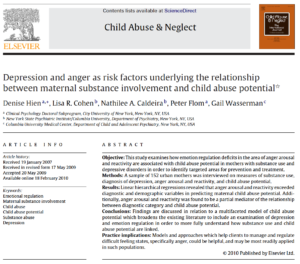
NIDA-funded cross-generation case control design, comparing three groups of women and their pre/early adolescent children. Based on previous studies, the model that was tested hypothesized that emotion regulation may be one important mediator of the relationships between drug use and parenting deficits. Participants were 187 women divided into three groups: cocaine using, depressed, and a healthy control along with their pre-adolescent children (ages 9-15).
This study:
- examined the association between maternal impairments (substance use disorders, general psychopathology, and cognitive/emotional self-regulation disturbances), child-rearing deficits (lack of empathic involvement, poor monitoring, parent-child conflicts, use of harsh discipline, child abuse and neglect), and adverse child outcomes (child self-regulation deficits, aggressive/delinquent behaviors, and substance use).
The EPI Study: Predictors of Interpersonal Violence for Inner City Women
This NIDA funded five year longitudinal case-control study compared diagnostic and psychosocial 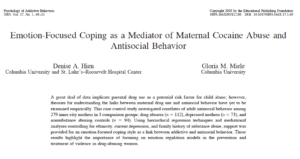 predictors of interpersonal victimization and perpetration among urban women with crack/cocaine dependence and depression. Participants were 333 inner-city women with co-morbid crack/cocaine dependence and depression.
predictors of interpersonal victimization and perpetration among urban women with crack/cocaine dependence and depression. Participants were 333 inner-city women with co-morbid crack/cocaine dependence and depression.
This study aimed to explore the degree to which a history of childhood abuse, crack/cocaine abuse, and/or depression predict violent victimization and aggressive violent behavior.
Personnel
Core Faculty:
Denise Hien, Ph.D., ABPP
Alexandria Bauer, Ph.D., Assistant Research Professor, GSAPP-Rutgers
Affiliated Collaborators:
Aimee Campbell, Ph.D., Division on Substance Use Disorders, Columbia University College of Physicians and Surgeons, NY
Eric Fertuck, Ph.D., City College of New York, NY
Teresa López-Castro, Ph.D., City College of New York, NY
Robert Melara, Ph.D., City College of New York, NY
Antonio Morgan-López, Research Triangle International, North Carolina
Lesia Ruglass, Ph.D., City College of New York and Affiliate of Rutgers Center of Alcohol & Substance Use Studies
Lissette Saavedra, Ph.D., Research Triangle International, North Carolina
Graduate Students:
Liza Franklin, GSAPP-Rutgers
Tanya Lalwani, GSAPP-Rutgers
Research Assistants:
Chantel Ebrahimi, The New School
Former Students and Post-Doctoral Fellows:
Skye Fitzpatrick, Ph.D., Assistant Professor, Department of Psychology, York University, Toronto, Canada.
Kathryn Zumberg Smith, Ph.D. Assistant Professor, Department of Psychology, Xavier University, Cincinnati, Ohio.
Patricia Yoon, Ph.D., Clinical Supervisor, Columbia University Counseling Center, Columbia University, New York, NY.
Santiago Papini, Ph.D., Postdoctoral Research Fellow, Clinical Informatics and Delivery Science, Kaiser Permanente Northern California Division of Research.
Suky Martinez, Ph.D., Postdoctoral Fellow, Department of Psychiatry, Columbia University, New York, NY.
Tanya Saraiya, Ph.D., Research Assistant Professor, Department of Psychiatry & Behavioral Sciences, Medical University of South Carolina.
Marina Weiss, Clinical Intern, Columbia University College of Physicians and Surgeons and Doctoral Candidate, Adelphi University
